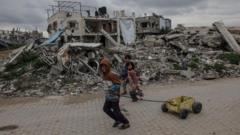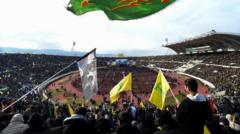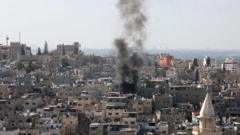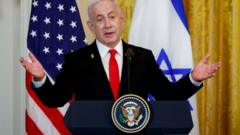The ongoing conflict reveals deepening tensions and a precarious humanitarian situation for those involved.
**Hamas Delays Hostage Release Amid Accusations of Israeli Violations**

**Hamas Delays Hostage Release Amid Accusations of Israeli Violations**
Hostage negotiations stall as Hamas cites Israel's non-compliance with ceasefire agreements.
The armed wing of Hamas has announced a postponement of the upcoming release of Israeli hostages, attributing the decision to alleged violations of the ceasefire by Israel. According to a spokesperson, the continuation of hostage exchanges hinges on Israel meeting its obligations, which they claim include not allowing the return of displaced Palestinians to northern Gaza, attacking civilians, and failing to provide humanitarian aid as previously agreed.
In response, Israeli Defense Minister Israel Katz condemned Hamas's announcement as a serious breach of the ceasefire agreement, stating he instructed the Israel Defense Forces (IDF) to remain on high alert for any developments in Gaza. Katz underscored the principle of not reverting to the situations seen prior to the conflict that erupted following Hamas's attacks on October 7, 2023.
The timing of Hamas's statement was particularly poignant as it coincided with a rally in Tel Aviv to commemorate the 24th birthday of Alon Ohel, one of the hostages kidnapped from an event during the attacks. At the rally, participants voiced their frustrations regarding the ongoing captivity of hostages, emphasizing the urgent need for their release and holding the government accountable for the delays.
A spokesperson for the United Nations highlighted the critical nature of maintaining the ceasefire, emphasizing that any delays could further complicate the already fragile situation. Hamas indicated a willingness to proceed with the exchange on the scheduled date if Israel complies with its end of the agreement.
The accusations made by Hamas included claims that Israel is obstructing both the return of displaced persons to Gaza and is using force against them, which the Israeli side has refuted. Tensions have escalated recently, with both sides accusing each other of not honoring commitments made under the current ceasefire conditions.
Since the ceasefire began on January 19, sixteen Israeli hostages and five from Thailand have been released in exchange for 566 Palestinian prisoners. So far, 33 hostages are projected to be freed by the end of the current agreement, amid rising concerns for their welfare, including reports of eight hostages already confirmed dead.
Hamas’s detainment of 251 hostages came during the brutal assault on October 7, which resulted in approximately 1,200 deaths in Israel, while subsequent military operations in Gaza are reported to have led to at least 48,000 Palestinian fatalities, according to sources linked to Hamas. As the hostage crisis continues, the complexities of the conflict remain ever-present, with various stakeholders emphasizing the dire humanitarian implications of the ongoing hostilities and territorial disputes.
In response, Israeli Defense Minister Israel Katz condemned Hamas's announcement as a serious breach of the ceasefire agreement, stating he instructed the Israel Defense Forces (IDF) to remain on high alert for any developments in Gaza. Katz underscored the principle of not reverting to the situations seen prior to the conflict that erupted following Hamas's attacks on October 7, 2023.
The timing of Hamas's statement was particularly poignant as it coincided with a rally in Tel Aviv to commemorate the 24th birthday of Alon Ohel, one of the hostages kidnapped from an event during the attacks. At the rally, participants voiced their frustrations regarding the ongoing captivity of hostages, emphasizing the urgent need for their release and holding the government accountable for the delays.
A spokesperson for the United Nations highlighted the critical nature of maintaining the ceasefire, emphasizing that any delays could further complicate the already fragile situation. Hamas indicated a willingness to proceed with the exchange on the scheduled date if Israel complies with its end of the agreement.
The accusations made by Hamas included claims that Israel is obstructing both the return of displaced persons to Gaza and is using force against them, which the Israeli side has refuted. Tensions have escalated recently, with both sides accusing each other of not honoring commitments made under the current ceasefire conditions.
Since the ceasefire began on January 19, sixteen Israeli hostages and five from Thailand have been released in exchange for 566 Palestinian prisoners. So far, 33 hostages are projected to be freed by the end of the current agreement, amid rising concerns for their welfare, including reports of eight hostages already confirmed dead.
Hamas’s detainment of 251 hostages came during the brutal assault on October 7, which resulted in approximately 1,200 deaths in Israel, while subsequent military operations in Gaza are reported to have led to at least 48,000 Palestinian fatalities, according to sources linked to Hamas. As the hostage crisis continues, the complexities of the conflict remain ever-present, with various stakeholders emphasizing the dire humanitarian implications of the ongoing hostilities and territorial disputes.




















